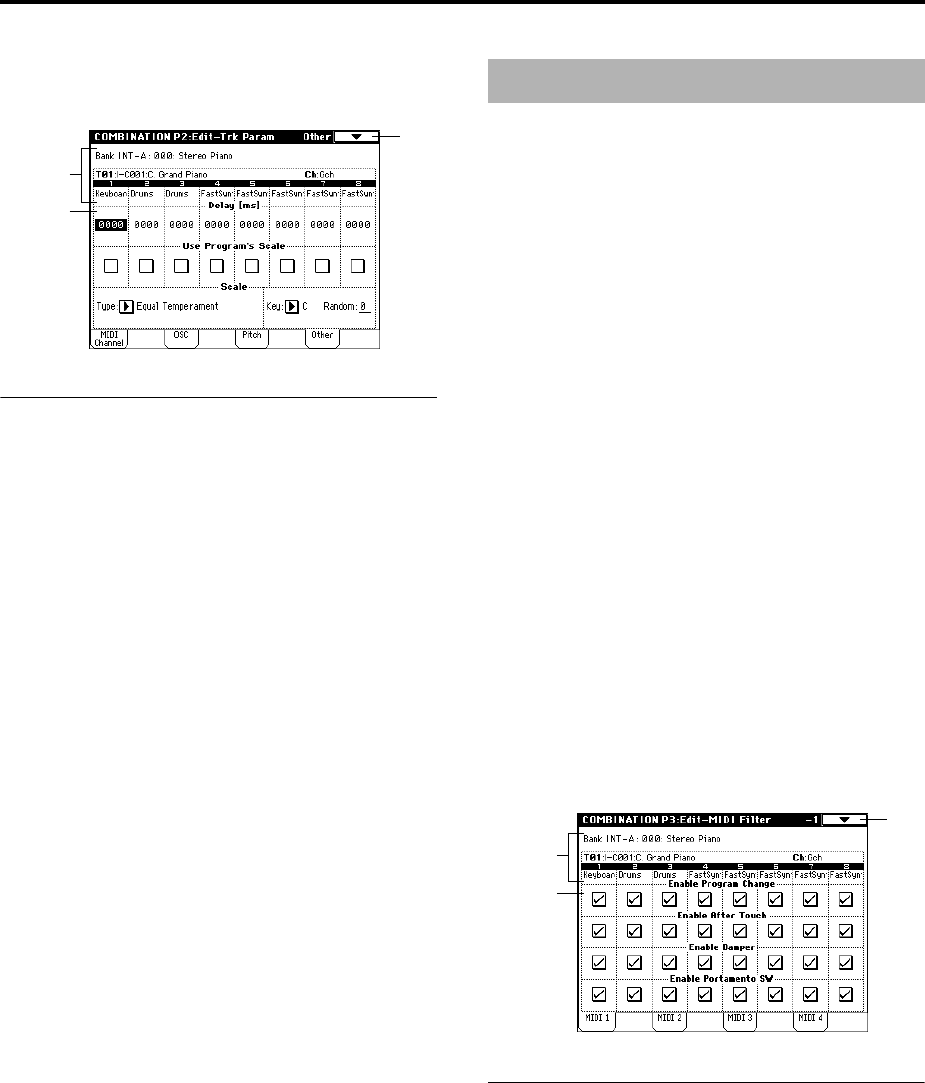
40
2–4: Other
Here you can make various other settings for each timbre.
2–4a: Delay, Use Program’s Scale, Scale
Delay [ms] (Delay Time) [0000…5000, KeyOff]
For each timbre, this specifies a delay time from note-on
until the sound begins.
KeyOff: The note will begin sounding at note-off. In this
case, the sound will not die away if the sustain level of the
program’s amp EG is other than 0. This setting is used when
creating harpsichord sounds.
Normally you will set this to 0.
Use Program’s Scale [Off, On]
Each timbre can use the scale that is specified by Scale (Pro-
gram P1: 1–1c).
On (checked): The scale specified by the program will be
used.
Off (unchecked): The scale specified by Scale will be used.
Scale:
Specifies the scale that the combination will use.
Type (Combi's Scale)
[Equal Temperament...User Octave Scale15]
Select the type of scale (☞“Type” Program P1: 1–1c).
Key [C…B]
Selects the tonic key of the selected scale (☞“Key” Program
P1: 1–1c).
Random [0…7]
As this value is increased, an increasingly random devia-
tion will be added to the pitch at each note-on (☞“Random”
Program P1: 1–1c)
These settings allow you to apply filters to the MIDI data
that will be transmitted and received by each timbre 1–8. For
example even if two timbres are being played by the same
MIDI channel, you can make settings so that the damper
pedal will apply to one but not the other.
On (checked): Transmission and reception of MIDI data is
enabled. When “Status” (0–1c, 2–1b) is INT, operation of the
built-in controllers or incoming MIDI data will apply the
effect of the checked item to the program of the correspond-
ing timbre. (The effect dynamic modulation function is not
affected by this setting.)
When “Status” is EXT or EX2, operation of the built-in con-
trollers will transmit MIDI data on that timbre’s MIDI chan-
nel. MIDI transmission and reception settings for the entire
TRITON STUDIO are made in “MIDI Filter” (Global P1: 1–
1b).
The Edit–MIDI Filter-3 and -4 pages contain MIDI filters for
assignable controllers (whose function can be set by the
user), and if these are assigned to MIDI control changes, the
filter settings will affect those control changes.
In this case, if the assignable controllers have been set to
control changes that are also found in the Edit–MIDI Filter-1
or -2 pages, the settings in the MIDI 1 and MIDI 2 pages will
take priority. Also, if the same control change is assigned to
two or more controllers in the Edit–MIDI Filter-3 and -4
pages, checking any one of them will enable that control
change.
Off (unchecked): Transmission and reception of MIDI data
is disabled.
3–1: MIDI 1 (MIDI Filter –1)
3–1a: Enable Program Change, Enable After Touch,
Enable Damper, Enable Portamento SW
Enable Program Change [Off, On]
Specifies whether or not MIDI program change messages
will be transmitted and received.
Enable After Touch [Off, On]
Specifies whether or not MIDI after touch messages will be
transmitted and received.
Enable Damper [Off, On]
Specifies whether or not MIDI control change CC#64 hold
(damper pedal) messages will be transmitted and received.
Enable Portamento SW [Off, On]
Specifies whether or not MIDI control change CC#65 porta-
mento on/off messages will be transmitted and received.
0–1
2–4a
2–1a
Combination P3: Edit–MIDI Filter
0–1
3–1a
2–1a


















